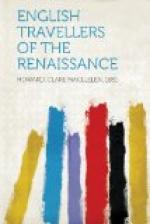Footnote 146: Stowe, Annales, ed. 1641, p. 867.
Footnote 147: Ibid., p. 869.
Footnote 148: Harrison’s Description of England, ed. Withington, p. 111.
Footnote 149: T. Birch, Court and Times of James I., i. 191.
Footnote 150: E. Lodge’s Illustrations of British History, ii. 228.
Footnote 151: Harleian Miscellany, vol. v. pp. 400-401.
Footnote 152: Leland, J., De Scriptoribus Britannicis, vol. i. 482.
Footnote 153: Calendar of State Papers, Foreign, 1562, Nos. 1069 and 1230.
Footnote 154: E. Nares, Memoir of Lord Burghley, vol. iii. p. 513.
Footnote 155: Lambeth MSS., No. 647, fol. iii. Printed in Spedding’s Letters and Life of Bacon, vol. i. p. 110.
Footnote 156: Calendar of State Papers, Domestic, 1603-1610, p. 634.
Footnote 157: Quoted in Life and Letters of
Sir Henry Wotton, ed. by
L. Pearsall Smith, vol. ii. p. 462.
Footnote 158: Fuller, The Church-History of Britain, ed. 1655, book x. p. 48. The alleged reason for Mole’s imprisonment, Fuller says, was that he had translated Du Plessis Mornay, “his book on the Visibility of the Church, out of French into English; but besides, there were other contrivances therein, not so fit for a public relation” (supra, p. 49).
Footnote 159: Fourth Baron Wentworth of Nettlestead and first Earl of Cleveland, 1591-1667, who became a Royalist general in the Civil War. At the time of Wotton’s letter (1609) he was completing his education abroad after residence at Oxford. See Dictionary of National Biography, which does not, however, mention his foreign tour.
Footnote 160: He was at once “reconciled” to the Church of Rome, entered the Society of the Jesuits, and “died a most holy death,” in 1626, while filling the office of Confessor of the English College at Rome. H. Foley, Records of Society of Jesus, vi. p. 257, cited in Life and Letters of Sir Henry Wotton, i. p. 457, note.
Footnote 161: Second Lord Harington of Exton, 1592-1614; the favourite friend and companion of Henry, Prince of Wales. A rare and godly young man. For an account of him, and for his letters from abroad, in French and Latin, to Prince Henry, see T. Birch’s Life of Prince Henry.
Footnote 162: “One Tovy, an ‘aged man,’ late master of the free school, Guildford.” Dictionary of National Biography, article on Sir John Harington, supra.
Footnote 163: Life and Letters of Sir Henry Wotton, i. 456-7.
Footnote 164: S.R. Gardiner, History of England, iii. 191.
Footnote 165: H. Foley, Records of the English Province of the Society of Jesus, London, 1882, Series ii. p. 253.
Footnote 166: Ibid.
Footnote 167: Foley, op. cit., p. 256. The facts are confirmed by the report of the English Ambassador at Valladolid, 17th July 1605, O.S., printed in the Winwood Memorials, vol. ii. p. 95.




